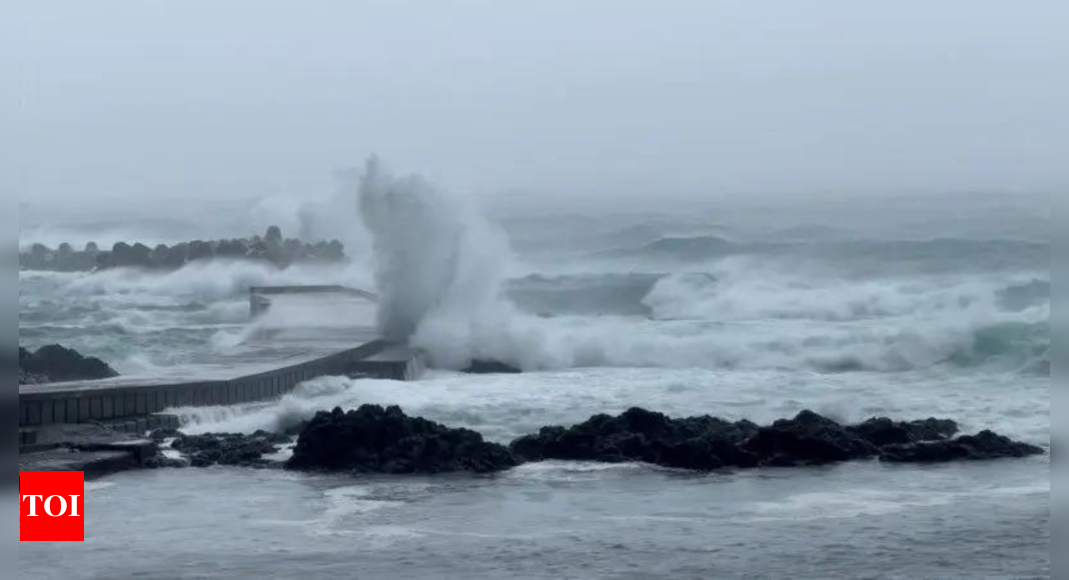
A “very strong” typhoon to hit Japan‘s Pacific coast on Friday, bringing intense winds and heavy rain, leading to the cancellation of numerous flights and trains in the Tokyo area and causing power outages for over 4,000 homes.
Typhoon Ampil, located about 300 kilometers south of Tokyo, was generating gusts up to 216 kph as it moved north, according to the Japan Meteorological Agency (JMA).
The eye of the typhoon was forecasted to pass northeastward along the Honshu coast, near Tokyo which houses around 40 million people, before returning to the Pacific on Saturday.
The JMA classified the weather system as “very strong,” just one level below its most severe category of “violent typhoon,” with peak wind speeds of 105 knots (120mph, 195kmh). The agency issued a warning advising the public to “be on high alert for storms, high waves, landslides, and flooding.”
The US military’s Joint Typhoon Warning Center predicted peak sustained wind speeds of 110 knots and gusts reaching 135 knots by 3:00 pm near Chiba, east of Tokyo.
Due to the typhoon, over 4,000 households in Chiba and other nearby prefectures lost power on Friday morning, as reported by the utility provider.
Both All Nippon Airways and Japan Airlines canceled numerous flights. All Nippon Airways canceled 335 domestic and international flights on Friday, with more cancellations expected on Saturday, affecting around 72,000 passengers. Japan Airlines canceled 361 flights, impacting 57,000 travelers.
Several parts of Japan’s bullet train network also shut down on Friday, including the busy route between Tokyo and Nagoya. Additionally, Tokyo Disneyland announced it would close from 3:00 pm due to the severe weather conditions.
The typhoon struck amidst Japan’s “obon” holiday week when millions of people travel back to their hometowns. This event follows Tropical Storm Maria, which recently brought record rainfall to northern Japan.
Isamu Teruya, a visitor from Saga Prefecture who arrived in Tokyo on Thursday, said, “We will check our phones for any information on the internet and if the typhoon seems OK, then we’ll go outside.”
“If the rain is really bad, then we will stay inside our hotel and relax,” Teruya added while speaking to AFP.
A recent study from researchers at universities in Singapore and the United States suggests that typhoons in the region are forming closer to coastlines, intensifying more quickly, and lasting longer over land due to climate change.
The study analyzed over 64,000 modeled historic and future storms from the 19th century to the end of the 21st century.
Typhoon Ampil, located about 300 kilometers south of Tokyo, was generating gusts up to 216 kph as it moved north, according to the Japan Meteorological Agency (JMA).
The eye of the typhoon was forecasted to pass northeastward along the Honshu coast, near Tokyo which houses around 40 million people, before returning to the Pacific on Saturday.
The JMA classified the weather system as “very strong,” just one level below its most severe category of “violent typhoon,” with peak wind speeds of 105 knots (120mph, 195kmh). The agency issued a warning advising the public to “be on high alert for storms, high waves, landslides, and flooding.”
The US military’s Joint Typhoon Warning Center predicted peak sustained wind speeds of 110 knots and gusts reaching 135 knots by 3:00 pm near Chiba, east of Tokyo.
Due to the typhoon, over 4,000 households in Chiba and other nearby prefectures lost power on Friday morning, as reported by the utility provider.
Both All Nippon Airways and Japan Airlines canceled numerous flights. All Nippon Airways canceled 335 domestic and international flights on Friday, with more cancellations expected on Saturday, affecting around 72,000 passengers. Japan Airlines canceled 361 flights, impacting 57,000 travelers.
Several parts of Japan’s bullet train network also shut down on Friday, including the busy route between Tokyo and Nagoya. Additionally, Tokyo Disneyland announced it would close from 3:00 pm due to the severe weather conditions.
The typhoon struck amidst Japan’s “obon” holiday week when millions of people travel back to their hometowns. This event follows Tropical Storm Maria, which recently brought record rainfall to northern Japan.
Isamu Teruya, a visitor from Saga Prefecture who arrived in Tokyo on Thursday, said, “We will check our phones for any information on the internet and if the typhoon seems OK, then we’ll go outside.”
“If the rain is really bad, then we will stay inside our hotel and relax,” Teruya added while speaking to AFP.
A recent study from researchers at universities in Singapore and the United States suggests that typhoons in the region are forming closer to coastlines, intensifying more quickly, and lasting longer over land due to climate change.
The study analyzed over 64,000 modeled historic and future storms from the 19th century to the end of the 21st century.









